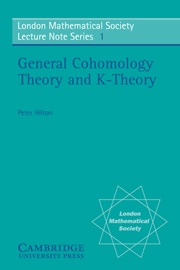Book contents
- Frontmatter
- Contents
- Introduction
- Chapter I General Cohomology Theories
- Chapter II Exact Couples and Spectral Sequences
- Chapter III The Generalized Atiyah-Hirzebruch Spectral Sequence
- Chapter IV K-Theory
- Chapter V K-Theory, the Chern Character and the Hopf Invariant Problem
- Appendix: On the Construction of Cohomology Theories
- Bibliography
- Frontmatter
- Contents
- Introduction
- Chapter I General Cohomology Theories
- Chapter II Exact Couples and Spectral Sequences
- Chapter III The Generalized Atiyah-Hirzebruch Spectral Sequence
- Chapter IV K-Theory
- Chapter V K-Theory, the Chern Character and the Hopf Invariant Problem
- Appendix: On the Construction of Cohomology Theories
- Bibliography
Summary
In the summer of 1968 I received an invitation to give a series of lectures on some topic in algebraic topology at the University of São Paulo, Brazil. The level was to be approximately that of a second year graduate course (at Cornell University, for example); that is to say, the audience would consist of people versed in ordinary homology and cohomology theory and in homotopy theory. It further appeared that the course would consist of nine lectures, each of one and a half hours’ duration, so that the topic had to be one in which a satisfactory ‘pay-off’ could be achieved in a relatively short time.
The topic of general cohomology theory, with special reference to K-theory, suggested itself very naturally. The existence of a comprehensive and readable literature, both original papers and books, made it justifiable to highlight some of the more sensational achievements of K-theory without giving details of all proofs. Moreover, by presenting K-theory as just one – though, to be sure, one of the most exciting – of the ‘new’ cohomology theories, it was natural to give some attention to properties of general cohomology theories and their relation to ordinary cohomology. The study of the entire category of cohomology theories and their interrelations is itself an area of active research and I was particularly concerned to place my audience in the position of being able to tackle open questions in this area; on the other hand, K-theory itself is now a well-established tool in topology and is probably not itself a promising topic for research among new initiates.
- Type
- Chapter
- Information
- General Cohomology Theory and K-Theory , pp. 1 - 6Publisher: Cambridge University PressPrint publication year: 1971

